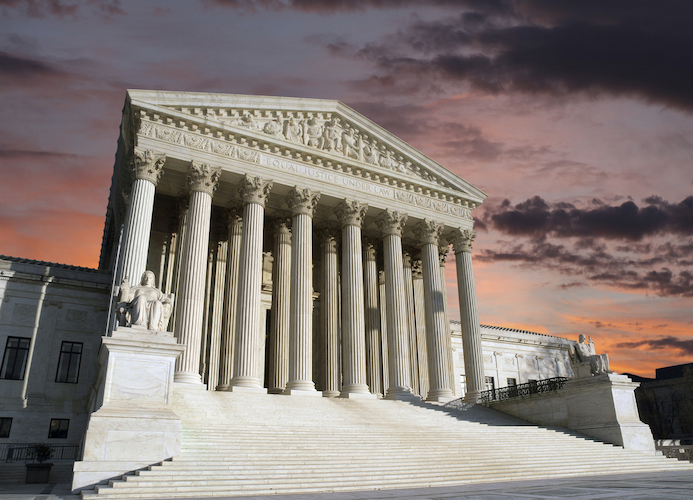Arbitration at Center of Last Week’s SCOTUS Oral Arguments

The U.S. Supreme Court heard oral arguments in four cases last week, with Justice Clarence Thomas participating remotely after being discharged from the hospital. The Federal Arbitration Act took center stage in two of the four cases. Other issues before the Court included the extent of Congress’ war powers under Article 1 of the U.S. Constitution.
Below is a brief summary of the cases the Court considered:
Southwest Airlines Co. v. Saxon: The case involves Section 1 of the Federal Arbitration Act (FAA), which states that the FAA does not apply “to contracts of employment of seamen, railroad employees, or any other class of workers engaged in foreign or interstate commerce.” In Circuit City Stores, Inc. v. Adams, 532 U.S. 105 (2001), the Supreme Court held that Section 1 applies only to interstate “transportation workers.” Because the Court did not define the term “transportation worker,” the lower courts have failed to consistently apply Circuit City’s holding. The question before the Court is “[w]hether workers who load or unload goods from vehicles that travel in interstate commerce, but do not physically transport such goods themselves, are interstate “transportation workers” exempt from the Federal Arbitration Act.”
LeDure v. Union Pacific Railroad Company: The case involves injury claims brought Union Pacific Railroad Company employee, Bradley LeDure, under the Federal Employers’ Liability Act (FELA) and Locomotive Inspection Act (LIA).The justices have agreed to decide “[w]hether a locomotive is in use on a railroad’s line and subject to the Locomotive Inspection Act and its safety regulations when its train makes a temporary stop in a railyard as part of its unitary journey in interstate commerce, or whether such use does not resume until the locomotive has left the yard as part of a fully assembled train, as held by the U.S. Court of Appeals for the 7th Circuit below, contrary to the decisions of the Supreme Court and other circuits.”
Torres v. Texas Department of Public Safety: The case centers on the federal Uniformed Services Employment and Reemployment Rights Act of 1994 (USERRA), which provides that “[a] person who is a member of … a uniformed service shall not be denied … reemployment … or any benefit of employment by an employer on the basis of that membership….” Congress enacted e USERRA pursuant to its War Powers under Article 1 of the Constitution, recognizing that unremedied employment discrimination by state employers based on military service could interfere with the nation’s “ability to provide for a strong national defense.” USERRA’s cause of action against state employers may be pursued only in state courts, which a Texas court found to be unconstitutional because Congress lacks the power to authorize lawsuits against nonconsenting states pursuant to its War Powers. The justice must now decide “whether Congress has the power to authorize suits against nonconsenting states pursuant to its War Powers.”
Viking River Cruises, Inc. v. Moriana: In AT&T Mobility LLC v. Concepcion, 563 U.S. 333 (2011), and Epic Systems Corp. v. Lewis, 138 S.Ct. 1612 (2018), the Supreme Court held that when parties agree to resolve their disputes by individualized arbitration, those agreements are fully enforceable under the FAA. While California courts follow Concepcion and Epic when a party to an individualized arbitration agreement tries to assert class-action claims, they refuse to do so when a party to such an agreement asserts representative claims under the California Private Attorneys General Act (PAGA), which—like a class action—allows aggrieved employees to seek monetary awards on a representative basis on behalf of other employees. Accordingly, the Court has agreed to determine “[w]hether the Federal Arbitration Act requires enforcement of a bilateral arbitration agreement providing that an employee cannot raise representative claims, including under PAGA.”
Decisions in all of the above cases are expected before the Court’s current term ends in June. Please check back for updates.
Previous Articles
SCOTUS Decision in Bowe v. United States Is First of the 2026 Term
by DONALD SCARINCI on February 5, 2026
In Bowe v. United States, 607 U.S. ___ (2026), the U.S. Supreme Court held that Title 28 U.S.C. § ...
SCOTUS Rules State Can’t Immunize Parties from Federal Civil Liability
by DONALD SCARINCI on January 29, 2026
In John Doe v. Dynamic Physical Therapy, LLC, 607 U.S. ____ (2025) the U.S. Supreme Court held that...
Supreme Court to Address Racial Discrimination in Jury Selection
by DONALD SCARINCI onWhile the U.S. Supreme Court has concluded oral arguments for the year, it continues to add cases t...
The Amendments
-
Amendment1
- Establishment ClauseFree Exercise Clause
- Freedom of Speech
- Freedoms of Press
- Freedom of Assembly, and Petitition
-
Amendment2
- The Right to Bear Arms
-
Amendment4
- Unreasonable Searches and Seizures
-
Amendment5
- Due Process
- Eminent Domain
- Rights of Criminal Defendants
Preamble to the Bill of Rights
Congress of the United States begun and held at the City of New-York, on Wednesday the fourth of March, one thousand seven hundred and eighty nine.
THE Conventions of a number of the States, having at the time of their adopting the Constitution, expressed a desire, in order to prevent misconstruction or abuse of its powers, that further declaratory and restrictive clauses should be added: And as extending the ground of public confidence in the Government, will best ensure the beneficent ends of its institution.





